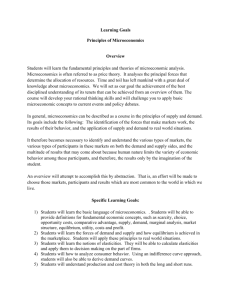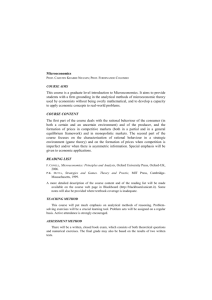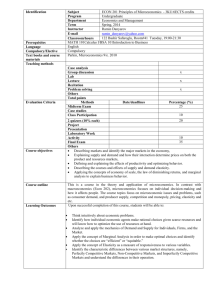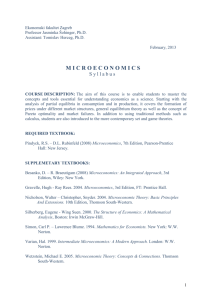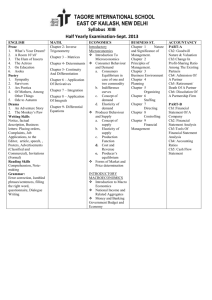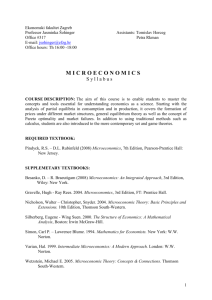ECONOMICS 2100 D*ECONOMICS AND POLICY
advertisement
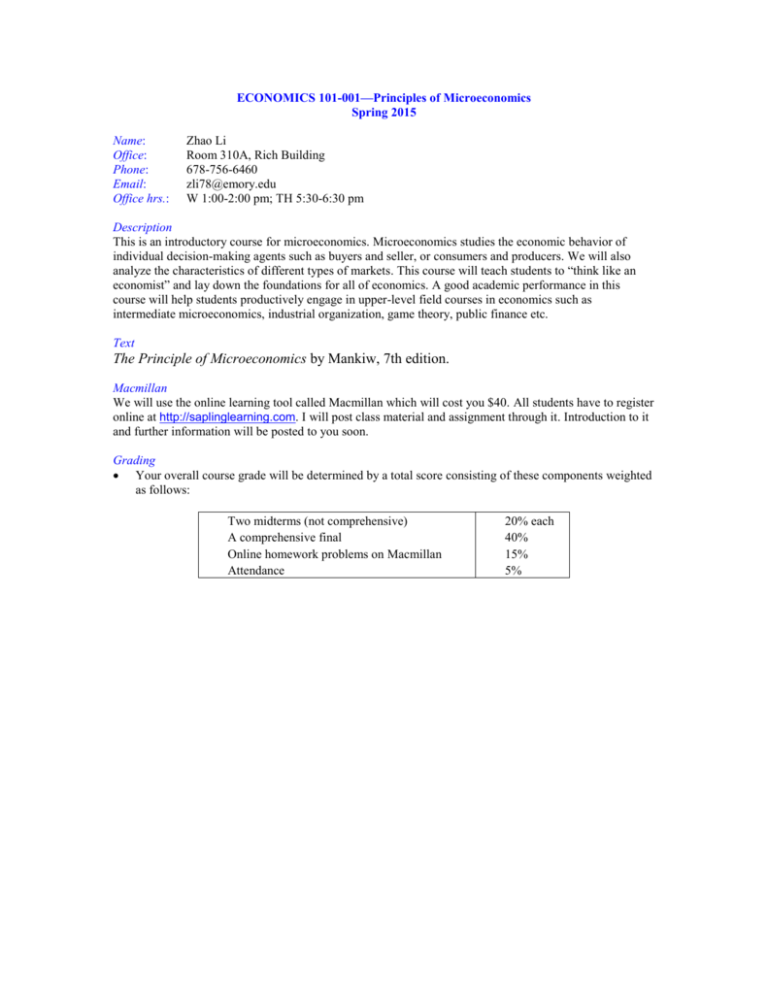
ECONOMICS 101-001—Principles of Microeconomics Spring 2015 Name: Office: Phone: Email: Office hrs.: Zhao Li Room 310A, Rich Building 678-756-6460 zli78@emory.edu W 1:00-2:00 pm; TH 5:30-6:30 pm Description This is an introductory course for microeconomics. Microeconomics studies the economic behavior of individual decision-making agents such as buyers and seller, or consumers and producers. We will also analyze the characteristics of different types of markets. This course will teach students to “think like an economist” and lay down the foundations for all of economics. A good academic performance in this course will help students productively engage in upper-level field courses in economics such as intermediate microeconomics, industrial organization, game theory, public finance etc. Text The Principle of Microeconomics by Mankiw, 7th edition. Macmillan We will use the online learning tool called Macmillan which will cost you $40. All students have to register online at http://saplinglearning.com. I will post class material and assignment through it. Introduction to it and further information will be posted to you soon. Grading Your overall course grade will be determined by a total score consisting of these components weighted as follows: Two midterms (not comprehensive) A comprehensive final Online homework problems on Macmillan Attendance 20% each 40% 15% 5% Preliminary grade cutoffs are: A A- 92 90 B+ B B- 87 83 80 C+ C/S C- 77 73 70 D+ D D- 67 63 60 F < 60 Those taking the course pass/fail need to make at least a ‘C’ in order to get an ‘S’ (satisfactory) grade. After the final, I may ‘curve’ your grades (i.e., lower the grade cut-offs). Your Macmillan score will be calculated as follows. At the end of the semester, I will calculate the percentage scores on each set, drop 2 of your lowest scores and take the simple average of the remaining scores. You are expected to attend every class. You are allowed 3 unexcused absence without penalty. Each additional unexcused absence lower your attendance score by 1 point until you lose all 5 points. In addition, if you miss more than 25% of the classes for this course, you cannot receive a grade higher than C. Please note that if you miss a Macmillan problem set, I cannot let you take it once the deadline has passed! However, if you know ahead of time that you will be unable to complete a set before its deadline for reasons outside your control, let me know as soon as possible and I will try to give you partial credit. There will be NO makeup tests in general. If something totally unforeseen comes up on the day of your test that prevents you from testing, contact me IMMEDIATELY. Responsibilities You are expected to adhere to Emory’s Academic Honor Code at all times. In taking this course, you affirm that it is a violation of the Code to cheat or facilitate cheating on exams, to plagiarize, to deviate from my instructions about collaboration on work that is submitted for grades, to give false information to a faculty member, and to undertake any other form of academic misconduct. You agree that I and my TAs are entitled to move you to another seat during examinations, without explanation. You also affirm that if you witness others violating the Code you have a duty to report them to the Honor Council. For the record, you may consult or work together with your classmates on Macmillan homework assignments—that does NOT constitute a violation of the Honor Code so long as you are not just copying off of others. Please start working on your problem sets early! You may change your answers as often as you wish until the deadline passes, at which point the last set of answers will be graded automatically. Feel free to consult with your classmates on difficult questions if you wish. Class Materials will be posted on Macmillan for download. I will enforce a strict no-electronic-devices-in-use policy in the classroom! That means no open computers, or texting on cellphones. If you need to use your phone, please exit the room to do so. Please silence all electronic devices that can make noise before you come into the classroom. In emailing me, please write ‘101’ as part of your subject line so I can filter your mail! ECON 101 Spring 2015: Tentative Course Outline (Updated 1/6/15) Week 1 2 3 4 5 6 7 8 Class 1 2 3 4 5 6 7 8 9 10 11 12 13 14 15 16 17 18 19 20 21 9 10 22 23 24 25 11 12 13 14 15 16 17 26 27 28 29 30 31 32 33 34 35 36 37 Day 1.14 1.16 1.19 1.21 1.23 1.26 1.28 1.30 2.2 2.4 2.6 2.9 2.11 2.13 2.16 2.18 2.20 2.23 2.25 2.27 3.2 3.4 3.6 3.9 3.11 3.13 3.16 3.18 3.20 3.23 3.25 3.27 3.30 4.1 4.3 4.6 4.8 4.10 4.13 4.15 4.17 4.20 4.22 4.24 4.27 5.4 Chapters 1 1 2 2 3 3 4 4 4 5 5 5 6 6 7 7 8 8 10 11 11 13 13 13 14 15 15 16 16 17 17 18 18 21 21 21 Course Topics Introduction to Microeconomics Introduction to Microeconomics MLK Day! Thinking Like an Economist Thinking Like an Economist Comparative Advantage and Trade Comparative Advantage and Trade Supply and Demand Supply and Demand Supply and Demand Elasticity and Its Application Elasticity and Its Application Elasticity and Its Application Government Interventions Government Interventions Market Efficiency Market Efficiency Review Session I Midterm Exam I Taxation Taxation Externalities Public Goods Spring Break! Spring Break! Spring Break! Public Goods The Costs of Production The Costs of Production The Costs of Production Competitive Markets Review Midterm Exam II Monopoly Monopoly Monopolistic Competition Monopolistic Competition Oligopoly Oligopoly The Labor Markets The Labor Markets The Theory of Consumer Choice The Theory of Consumer Choice The Theory of Consumer Choice Review FINAL EXAM: 3:00 P.M - 5:30 P.M

